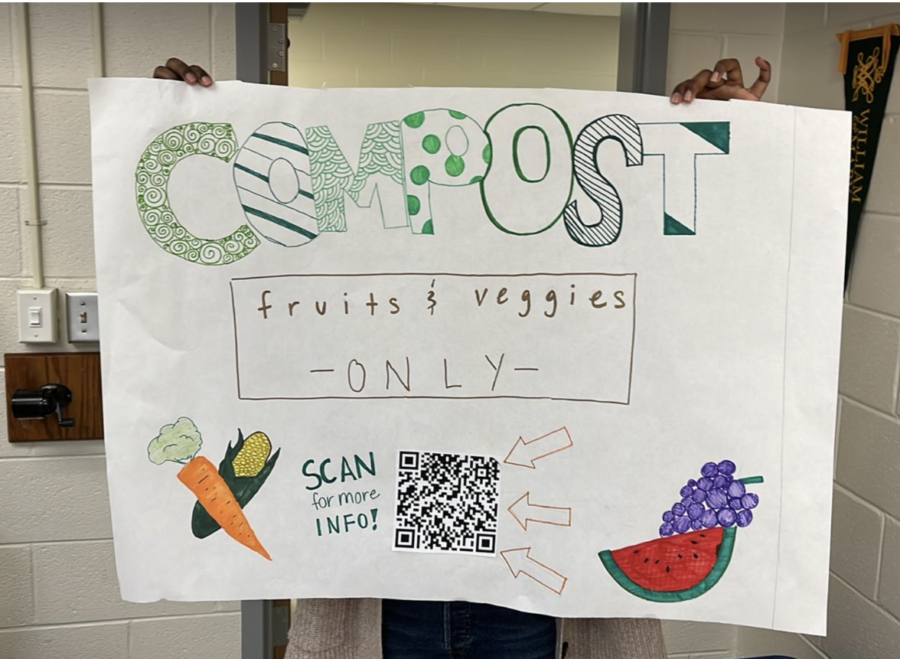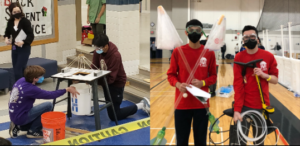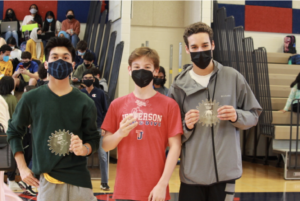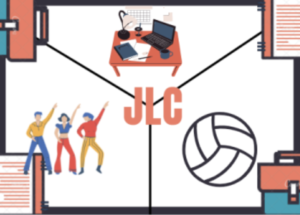Environmental Impact Club implements new composting system
Junior Anika Rekulapelli holds the composting sign up before setting up the composting system. The composting system was set up on Apr. 18 and will be holding its trial week until Apr. 22 to get a general scope of students’ food waste.
April 22, 2022
At Jefferson, we see food wasted on a daily basis: your friend takes a bag of cucumbers but leaves it unopened, or maybe you get fries that you don’t finish. At the end of lunch, those multitude of choices lead to mountains of food and trays that pile in trash bins, eventually making their way to the landfills.
Those fries and cucumbers that you pass during lunch are part of a larger issue at hand. In US cafeterias alone, food waste is estimated to total 1.06 billion pounds per year, contributing to major waste of resources, as well as carbon and methane emissions, making it all the more important to begin composting.
With the growing need for composting, more people have been utilizing its potential to reduce their levels of waste. At Jefferson, students in the Environmental Impact Club (EIC) have led a new composting initiative for the school cafeteria starting Apr. 18, hoping to make a positive impact on Jefferson’s environmental sustainability.
The composting system was initially ready to start up in 2019; however, since its quarantine break, the plans were able to continue this year due to the return of in-person learning. Junior Becca Jeffries, Head of the Composting Committee, has helped pick up the project and get it running.
“Over quarantine, I became the project leader, although we haven’t been able to restart work on the project until the return to school this fall,” Jeffries said. “We definitely faced a lot of challenges trying to pick up where we left off. The main complication was that the cafeteria manager who had approved the project switched schools, and was replaced by someone new. So, we had to completely restart the process of gaining approval and convincing the cafeteria staff of the system’s benefits.”
The Composting Committee has allocated labeled bins for students to transfer leftover fruits and vegetables–the result will be taken by public composting centers, other clubs, and even students who simply want to repurpose the soil for themselves.
“There are a lot of possibilities for how to use the compost once it is finished, such as other environmental/gardening clubs at TJ using it. If there is little interest in this or if there is a surplus of compost, we are planning to drop it off at a Fairfax County compost collection site,” said Jeffries.
The composting initiative will be a significant contribution towards creating a more eco-friendly environment at Jefferson, shining light on the importance of sustainability and our current issue of waste production.
“I’ve read different NatGeo articles online about climate change, and I think it’s really important to make an impact,” junior and Environmental Impact member Anika Rekulapelli says. “I’m hoping that we can reduce our waste, starting with the cafeteria, because I know that a lot of things probably get thrown away. Hopefully that can expand to recycling more and composting more in general.”
Not only will the system manage the food waste at Jefferson, but it may spread awareness and inspiration for starting up composting systems at homes, as well as promoting a more sustainable lifestyle.
“I’m also hoping that the composting system will help encourage a green mindset among
TJ students so that they are more likely to follow sustainable practices in their own homes,” Jeffries added.
However, the composting system is complicated, especially at a busy school like Jefferson, making it all the more important for students to make reliable and responsible decisions. Members of the Composting Committee are putting lots of trust into the student body, even if it’s as small of a responsibility as putting items into the correct bin, which can make a really great impact, as well as the future years to come.
“I am very optimistic about the future of composting at TJ. As a home composter, I know the process very well and I am excited to bring it to a large-scale environment like TJ,” Jeffries said.










